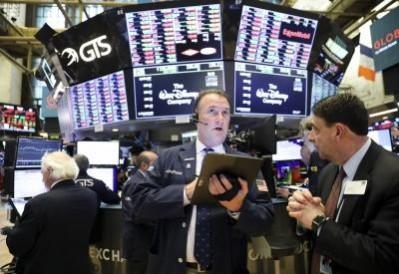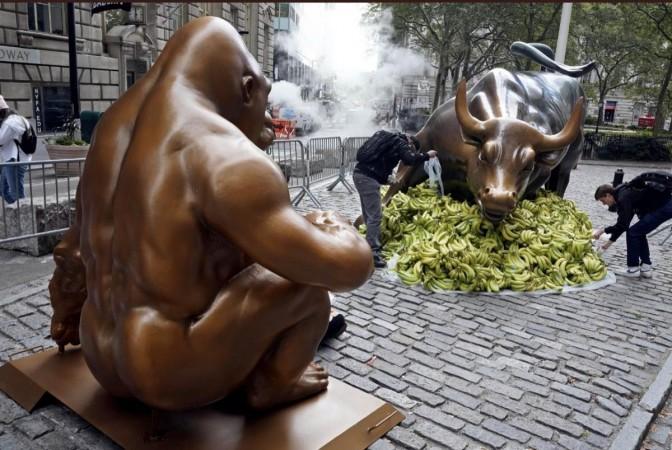Most US stocks have slumped as the barometer of scrips indices, the tech-heavy Nasdaq Composite, lost 0.3 per cent and the Dow Jones Industrial Average slumped by 0.2 per cent, on the back of a report that China's economy is recovering.
US stocks opened lower on Friday as the major indexes failed early on to build on a late Thursday rally. The S&P 500 was down 0.3 per cent, while the Dow Jones Industrial Average slumped by 0.2 per cent. The tech-heavy Nasdaq Composite lost 0.3 per cent, media reports here said.
Analysts feel the US stock slump could have ripple effect on the leading stock exchanges of the world particularly in London, Paris, Germany, France and other parts of Europe and Asia.

The stock market's behaviour was largely influenced by reports that China reported that its economy picked up steam last month, easing concerns about the world's second-largest economy. In the US, the United Auto Workers union officially launched a historic strike at three of the biggest automakers' plants across the US.
The UAW strike could affect US car makers' subsidiaries such as Ford and GM in India with their scrips taking a hit in both NSE and BSE. Trading will resume in Indian bourses on Monday. Also, it may cool off over the weekend.
Focus was also on British chipmaker ARM, which debuted on public markets on Thursday with a near-25 per cent rise. ARM stock was up 5 per cent in the early going on Friday.
The Wall Street benchmarks rallied Thursday, after the labour ministry released data on inflation as retail sales and wholesale price inflation for August returned hotter than anticipated. Such signs of resilience in the US consumer market and persistent price pressures can influence Fed rate hikes but it may also mean the Fed could be leading the US economy for a soft landing, reports said.

A recent oil price rally sparked the rise in inflation, with a significant effect on stocks.
India stocks
On Friday, WTI crude and Brent crude futures, on which India is heavily dependent, took a slight break in the rally, dipping down from the 2023 highs hit on Thursday. This trend could have an impact on state run companies shares such as ONGC, Oil India and IOC and others.
Ford Motor Company: Shares of the leading US car maker lost 0.5 per cent on Friday after the United Auto Workers (UAW) union said it will strike at Big Three automaker plants. Shares of Stellantis (STLA) rose 0.8 per cent while General Motors (GM) shares increased 0.6 per cent.

The union said it will implement a "stand up" strategy in which workers will not strike all Big Three company plants at once but will call on select local UAW chapters to walk out at designated times, media reports said.
Lennar (LEN): The homebuilding company posted a third-quarter earnings beat on Thursday, citing quarterly revenue of $8.7 billion. But shares fell more than 3 per cent during morning trading on Friday as margins on home sales fell to 24.4 per cent compared to the nearly 30% during the same period last year and as revenues decreased 2 per cent from the year-ago quarter as the average sale price of home deliveries dropped.
Nikola Corporation (NKLA): Nikola's shares climbed 1 per cent on Friday after the car company announced an expansion of its dealer network into Canada.
Consumer inflation expectations are at their lowest level since the Fed started raising interest rates in 2021.
New data from the University of Michigan showed consumers expect prices to rise 3.1 per cent over the next year, down from 3.5 per cent per cent last month, and the lowest reading since March 2021. Expectations for 5-10 year price increases fell to 2.7 per cent in September, down from 3 per cent the month prior, media reports said .
"Throughout the survey, consumers have taken note of the stalling slowdown in inflation, but they do expect the slowdown to resume," Joanne Hsu, director of survey of consumers for the University of Michigan, said in a statement.
(With inputs from IANS)









